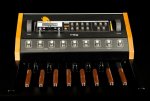Playing bass like a guitar is, usually, blahhhhh.
I think one needs to define exactly what is meant by "playing bass like a guitar." Gekko's definition meant "overplaying" whereas mine doesn't mean that exclusively but does incorporate that sometimes. But as I pointed out earlier, in my opinion, there were/are a lot of jazz double bassists that overplay. Ginger Baker felt that Jack Bruce always overplayed !
It's also hard to avoid if coming from guitar.
I agree but my take on that is that sometimes, that can actually be a positive thing ~
sometimes. But the OP's statement that "a bass guitar has enough musical stylings, techniques and nuances" is the bottom line for me.
Which is why I like
Listen back & if the bass doesn't serve the song you're doing it wrong.
^^^^^When all is said and done, this for me is the litmus test.
When I think back to the way I used to play bass in the first ten to fifteen or so years that I played, I don't think serving the song was something I truly considered, partly because
a]playing live, the people that I played with in that period weren't really used to playing that much with bass guitar or more to the point didn't really think about bass guitar {it was just something that you 'had'} so being a forceful character at times, I was left to my own devices and
b]partly because most of the time, when I jammed I jammed with just a drummer and wrote most of my songs on bass so the bass parts
were the song.
Recording changed all that. That I heard the bass part as the song was irrelevant; human beings just don't hear songs that way. So having lovely inventive melodic bass parts that clash with pretty much everything else is worse than having no bass at all or a basic banal part. Somewhere in the last 10 years I've learned the balance of how to sculpt the bass for the song and what kind of bass is necessary. Interestingly, I've noticed as a consequence, that many bass players, in my opinion, overplay. And a whole load underplay and don't drive or underpin.
Schwarzenyaeger , enjoy your bass ! By the way, are you in Oxford itself ? My sister lives up in Yarnton.




 ) and establish the foundation for everyone else to sit on.
) and establish the foundation for everyone else to sit on.